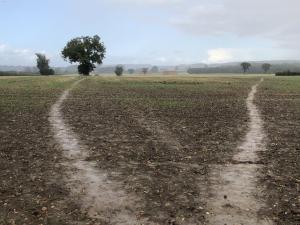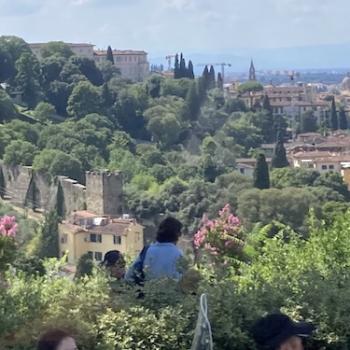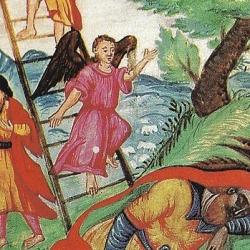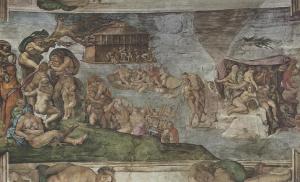Is there theological significance to belonging to a place? This question is on my mind today, since my wife and I closed on a house–and the earth it sits on–yesterday. Is that place holy? Can we become holier by living there?

Land ownership in the U.S. is random. I was born and grew into sufficient privilege to convince banks that my income is reliable. My ancestors won a generations-long war with various Native tribes. Socialism never took hold as a competitive economic option here. The car I drive seems able to handle the commute out of a glutted Austin real estate market. Because of all that, I own earth. It doesn’t seem to mean much, by all those standards. But what could it mean to me as a theologian and Christian?
What Does the Land Want to Teach?
When God made a covenant with Abraham’s children, God brought them to a place and gave them a land. That’s a central piece of the biblical story, but a difficult one. It’s difficult especially in light of the contemporary politics of Israel, which often leave me feeling that many Jews and Christians are missing something important in the narrative of landed-covenant.
The land of Israel will not be like the vegetable gardens of Egypt, Moses tells the runaway slaves in Deuteronomy 11. They watered Egyptian gardens with their feet. I’m not sure what that means, except that maybe it involved no back bending. Maybe the Nile was always ready to rush through the gardens, so that the Israelites simply had to kick away a clod of dirt and the water would flow.
Their own land will be different. “Blessed precisely in the fragility that necessitates and therefore guarantees God’s unwavering attention.” That’s how Ellen Davis puts it in her remarkable book. The land will teach them particular practices of waiting on that blessing. God can make deserts bloom and barren land places of plenty. The manna of the exodus began to teach them that. The promised land will continue the lesson. It will teach them to wait on the holy God to bring rains and food.
How is a Farmer Like a Farm?
That’s Davis’s delightful question about Leviticus. It makes me think of the Mad Hatter’s question to Alice: “Why is a raven like a writing desk?” For the Hatter the question is answerless. It’s part of the nonsense world that Alice has fallen into.
But Israel’s Torah, with its complex of overlapping laws, only seems random and nonsensical. Do not harvest to the edge of your fields. Or shave the corners of your beards. Or mix meat and dairy on your plates. Be holy as I, your God, am holy.
You can’t learn God’s holiness in a land of foot irrigation, when you’re standing straight up. You need to get intimate with the land. This land is, as Moses warned them, “a land of hills and valleys” (Deut 11:11). So the hunters and tillers will need to know the rises and falls of the earth. The places where water runs. The little caves where creatures live.
In addition, farmers must become like the lands they farm. Their shaving practices will remind them of their harvest commitments: leave the edges. Those commitments will remind them that God provides, without our anxious maximizing of productivity. In fact, the unharvested edges of fields will provide for hungry people who do not own arable land. So their shaving makes their bodies like their fields, and their fields make them holy providers like God.
Similarly, kosher laws remind Israel how God separated them out from anxiety-driven economies. Sabbath laws remind them that they are no longer slaves, foot-watering and brick-making with no rest. This then transfers to jubilee laws, when along with those suffering from debt, Israel also liberates the hard-working land itself. The land gets a sabbath. Tired land teaches us what it means to rest from our labor like the holy God rested.
How do we Dwell in a Place?
Israel is called to dwell in a land. Norman Wirzba says that we tend to think of a dwelling as something we make. But the biblical language is clear: God makes dwellings, and we get to dwell there. There is an element of risk here that both we and Israel have to confront: God’s land will spit out the gardeners if they do not learn the holiness that the land is trying to teach.
What would change if we understood our own places of dwelling—homes, offices, churches—this way? As one of my students put it, what if purchasing a piece of land didn’t mean we own it, but that we now belong to it, and are responsible for it?
We would have a hard time, for instance, justifying practices like mountaintop removal. Or industrial farming with little concern for its carbon release. Or our sprawling urban spaces that remake landscapes in our own image. We would be too busy bending over the hills and rises, noticing what lives there, what grows and interacts there.
Can A Place Make Us Holy?
Most of all, we would come to see land as a gift: a gift given with a purpose. If God gave my family that bit of land yesterday, it’s so that we can learn to be holy as God is holy. To dwell, to pay attention, and see what blessings come.
Israel was always meant to share that gift of healing holiness. That’s why, by my reckoning, the militarized wall-building of contemporary Israel is far from the vision of the Law and Prophets. As is most construction in urban sprawl zones. Including the land I just purchased.
Land isn’t real estate, and it’s not price. Wendell Berry keeps trying to tell us that. It’s gift. A place to pay attention. To bless, offer blessing, and let God’s holiness run its course.











